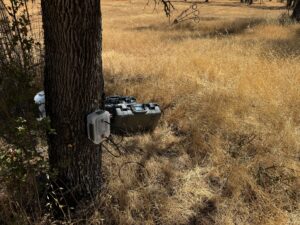Environmental Technology Lab
Home
Welcome to the Environmental Technology Lab!
At the Environmental Technology Lab, based in the Department of Geography at the University of Tartu, we are dedicated to advancing our understanding of the dynamic interactions between the terrestrial biosphere and the atmosphere. Our research delves into the physical, biological, and chemical processes that drive the exchange of trace gases and energy. By studying how plants, microbes, and ecosystems function, we aim to uncover the intricate ways the biosphere “breathes”—regulating the flux of gases and the energy needs.
Our overarching mission is to contribute valuable insights into mitigating climate change by understanding the role of ecosystems in the global carbon cycle. Through a blend of experimental fieldwork, innovative technology, and cross-disciplinary approaches, we tackle some of the most pressing environmental challenges in the face of climate change.
Core Research Areas:
-
Greenhouse Gas Exchange: We quantify the exchange of key greenhouse gases—such as carbon dioxide (CO₂), methane (CH₄), and nitrous oxide (N₂O)—across a variety of land-use types such as wetlands, forests, agricultural land and savannas. Using cutting-edge eddy covariance techniques and chamber-based measurements, we explore how land management practices and ecological dynamics impact these gas fluxes.



-
Wetland Biogeochemistry: Our work investigates the chemical, physical, and microbial properties of wetlands and agricultural land to understand their role in carbon storage and greenhouse gas emissions. We integrate soil science, hydrology, and microbial ecology to explore how target ecosystems function as carbon sinks or sources.


-
Wetland Restoration and Management: We focus on developing evidence-based strategies for wetland restoration that maximize carbon sequestration while minimizing methane and nitrous oxide emissions. Our goal is to find scalable solutions that enhance the climate mitigation potential of wetlands.


-
Ecological Engineering for Water Protection and for sustainable Agriculture: We develop nature-based solutions for environmental protection in agricultural, forestry, and urban systems. Our ecological engineering efforts aim to improve water quality, enhance carbon storage, and reduce pollutant loads through sustainable practices. We study wetlands sediment potential as an agricultural soil amendment to increase crop yield and quality.


Ecosystems where current research takes place:
- Abandoned peat extraction areas
- Restored peatlands and wetlands
- Forests
- Savannas
- Agricultural lands
- Lakes and rivers


